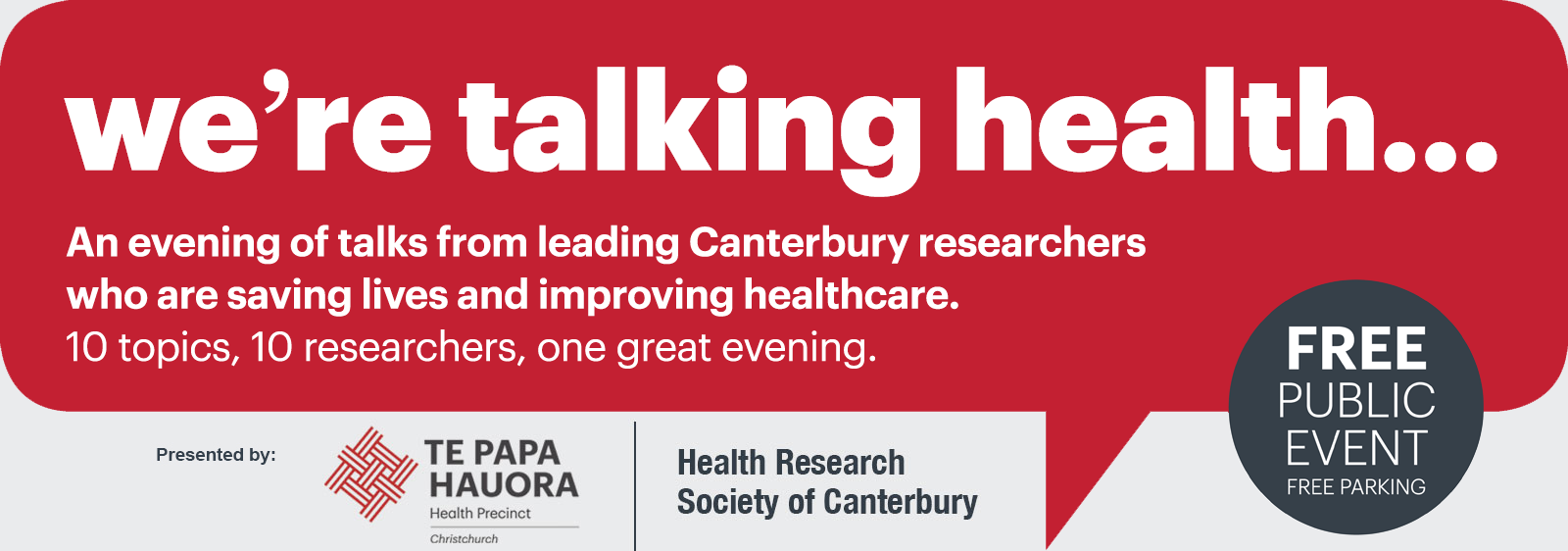
Video recordings of the talks
Averting the grim reaper
Professor Vicky Cameron (Otago)
Smokers, the stressed-out, middle-aged men with high blood pressure. These are the people we most often categorize as being at the highest risk of having a heart attack. But sudden and deadly heart attacks often strike those outside this group. University of Otago, Christchurch’s Professor Vicky Cameron will share information about blood tests being developed by her research group to identify hearts under extreme stress, and work to predict those most at risk of imminent death from a heart attack to provide an opportunity for preventive action.
Preparing the next generation of surgeons for rare procedures
Jon Wells (CDHB)
Some types of operations are performed only a handful of times in a surgeon’s career – but need to be done perfectly the first time, and every time after. Canterbury DHB paediatric surgeon Jon Wells will tell you about a simulator he and his colleagues invented to teach young surgeons how to perform a rare operation most often required by premature babies.
Bugs and bowel cancer
Professor Frank Frizelle (CDHB/Otago)
Scientists around the world are studying the microbiome – or communities of trillions of bacteria– to understand their impact on health and disease. Bowel cancer surgeon and researcher Professor Frank Frizelle and his team were the first to match specific ‘communities’ of bacteria in the gut to specific sub-types of bowel cancer. He will tell you how understanding these communities can improve patient treatment, and possibly prevent cancer developing.
Well women birth better in primary care
Rea Daellenbach (Ara)
Ara maternity researcher Rea Daellenbach and her colleagues studied outcomes for women and their babies if they birthed at a primary maternity unit, or Christchurch Women’s Hospital. Learn what the researchers found about the use of forceps, rates of emergency caesareans and newborn health, depending on where babies were born.
Replacing drugs with virtual reality
Peter Dooley (CDHB)
Canterbury DHB MRI manager Peter Dooley gives children going through MRI a virtual reality experience rather than drugs to ease their anxiety. The initiative is helping children and cutting waiting lists. He will show you what the children experience, and tell you why big technology companies want to be involved with his initiative.
How sleep interventions are helping autistic children.
Dr Laurie McLay (Canterbury)
Up to 80 per cent of children and young people with autism have sleep problems, such as not wanting to sleep alone and waking many times during the night. These issues often badly affect the functioning and quality of life for them and their families. Hear about some of the innovative techniques Dr Laurie McLay and her colleagues from the University of Canterbury have developed to improve sleep patterns.
The Cantabrians and the ‘God particle’
Dr Tracy Kirkbride (Ara) and Professor Anthony Butler (Otago)
Father and son scientists Professors Phil and Anthony Butler employed technology used to identify the so-called ‘God particle’ to invent a new form of colour scanner. The technology – named the MARS scanner – is widely anticipated to revolutionize medical imaging. Medical physicist Tracy Kirkbride will explain how the scanner will enable a far more detailed view inside our bodies and will speed up diagnosis and improve treatment.
The genetics of anorexia
Dr Jenny Jordon (Otago)
Psychologist Dr Jenny Jordon will explain the latest research on anorexia nervosa, and how she and her colleagues from the University of Otago, Christchurch are part of a global study to identify whether particular genes predispose people to suffering from the eating disorder.
Māori health: what we know and why doing nothing is not an option
Amber Clarke (Matapopore)
Cannabis: What’s the harm?
Associate Professor Joe Boden (Otago)
How does using cannabis, particularly as a youth, affect your future income, educational achievements, mental health, and use of other illicit substances? University of Otago Associate Professor Joe Boden of the Christchurch Health and Development Study will answer these questions, using evidence from more than three decades of studying people born in Christchurch 1977.
Closing remarks
Dr. Ian Town, Chair, Health Precinct Advisory Council
